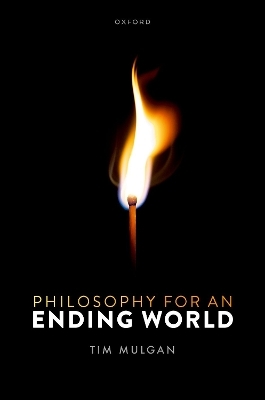
Philosophy for an Ending World
Oxford University Press (Verlag)
978-0-19-285617-3 (ISBN)
Tim Mulgan introduces a new thought experiment: the world will end in two hundred years, and humanity faces imminent and unavoidable (but not immediate) extinction. This book presents imaginary philosophical debates and lectures within this slowly ending world. The Ending World is both a provocative thought experiment and a challenging possible future. Exploring it from within - adopting the perspective of philosophers living in that ending world - helps us to imagine this world from the inside, to evaluate it as a possible future, to discover what we owe to future people who might inhabit such a future, and to explore how we might justify ourselves to them. The book explores contemporary debates about pessimism, the meaning of life, the existence of God, the purpose of the universe, the permissibility of creating new people, the need to connect with past and future people, the rectification of historical injustice, the design of utopias, and the desirability of escaping into virtual realities. It draws on a wide range of work in contemporary philosophy - including Samuel Scheffler's discussions of human extinction, Jonathan Lear's exploration of radical hope, David Benatar's anti-natalism, work on procreative ethics by Rivka Weinberg, Melinda Roberts, and Elizabeth Harman, and the author's own previous work on collective consequentialism, future ethics, and alternative conceptions of divine purpose.
A central question throughout the book is whether we could equip our descendants to flourish in an ending world, even if we cannot imagine flourishing there ourselves. The book defends an innovative account of our obligations to future people, based on the need to launch multigenerational projects to transform our inherited traditions and values so that they will still make sense even at humanity's end.
Tim Mulgan was educated at the Universities of Otago and Oxford, where he wrote his DPhil thesis under the supervision of Derek Parfit, Bernard Williams, and Roger Crisp. He is currently Professor of Moral and Political Philosophy at the University of St Andrews and Professor of Philosophy at the University of Auckland. He is the author of The Demands of Consequentialism (Oxford, 2001), Future People (Oxford, 2006), Ethics for a Broken World (Acumen, 2011), and Purpose in the Universe (Oxford, 2015).
Prologue: Life at humanity's end
Introduction
Cast of Characters
1: First Debate: Pessimism for an ending world: the meaning of life in the face of oblivion
2: Second Debate: Religion for a Post-Cataclysm World
3: Lecture One: Introducing Multigenerationalism
4: Lecture Two: Introducing Procreative Ethics
5: Lecture Three: Weinberg's Contractualist Procreative Ethic
6: Lecture Four: Collective Consequentialist Procreative Ethics
7: Lecture Five: Moral Progress, Transformation, and Imaginativeness
8: Lecture Six: Post-Cataclysm Utopias
9: Third Debate: Virtual Endings and Digital Futures
Conclusion: Lessons from an Ending World
| Erscheinungsdatum | 05.04.2024 |
|---|---|
| Verlagsort | Oxford |
| Sprache | englisch |
| Maße | 160 x 240 mm |
| Gewicht | 672 g |
| Themenwelt | Geisteswissenschaften ► Philosophie ► Ethik |
| Geisteswissenschaften ► Religion / Theologie | |
| ISBN-10 | 0-19-285617-0 / 0192856170 |
| ISBN-13 | 978-0-19-285617-3 / 9780192856173 |
| Zustand | Neuware |
| Haben Sie eine Frage zum Produkt? |
aus dem Bereich


